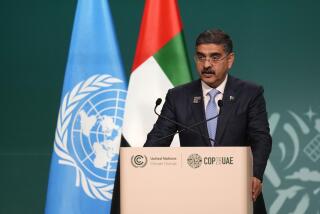Children, candy, death
- Share via
Even by the standards of insurgent violence in Iraq, the killing Wednesday of nearly 20 children who flocked around a U.S. Army vehicle to seek candy from soldiers was horrific. A suicide bomber drove into the crowd and detonated his car. Iraqis should be outraged, but they need to go beyond emotion to action. They need to take the lead to root out men, whatever their proclaimed motives, who murder the innocent and the young.
The attack in a residential Baghdad neighborhood also killed a U.S. soldier and several Iraqi adults; it was the deadliest insurgent assault in more than two months. No one claimed responsibility. Significantly, a statement purported to be from the Al Qaeda in Iraq group headed by Jordanian Abu Musab Zarqawi denied participation in the attack.
The disavowal could indicate worry about a backlash against the deaths of youngsters. Iraqis have asked why insurgents were killing their fellow citizens in an attempt to force coalition troops to leave. Now they ask again, “Why kill children?”
The death toll is bad enough without murdering the young. The Ministry of Health reported nearly 1,600 civilians killed in the first half of this year, most at the hands of insurgents. About 900 members of Iraqi security forces and 447 U.S. troops have also been killed in that period.
This isn’t the first time terrorists have killed children. In September, several suicide bombers killed about three dozen children crowded around soldiers dispensing candy at a water treatment plant in southern Baghdad. It’s a twisted, morally depraved logic that equates candy-seeking children with occupation “collaborators.”
One day after the Baghdad tragedy, U.S. officials reported the capture of another key member of Zarqawi’s group, the second arrested in a week. The Al Qaeda affiliate has been responsible for numerous attacks across Iraq; dismantling or disrupting the network could go far toward reducing violence in the months before the adoption of a constitution and new elections for a national assembly.
Since the invasion in March 2003, insurgents have killed the top United Nations official in the country, the Egyptian ambassador, clerics and many police recruits. They have planted bombs by the road, dispatched suicide bombers and beheaded some of their victims. Security forces can’t stop all attacks; they depend on help from Iraqis to provide intelligence about guerrilla plans. Even those who want coalition troops to leave immediately should understand that a nation can’t be built on the bones of murdered children.
More to Read
Sign up for Essential California
The most important California stories and recommendations in your inbox every morning.
You may occasionally receive promotional content from the Los Angeles Times.










